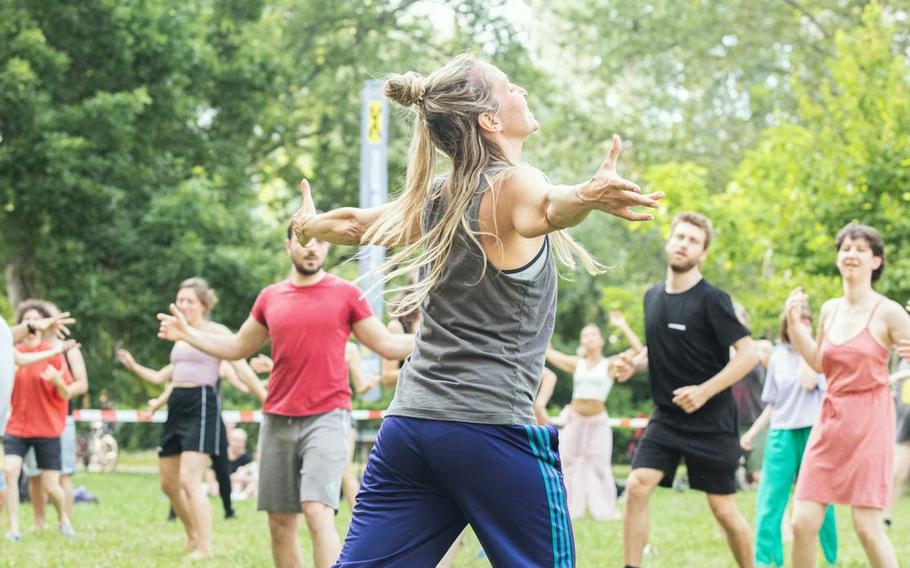
ImPulsDanz festival events invite attendees to join in this weekend in Salzburg and July 11-Aug. 11 in Vienna, Austria. (Silke Grabinger)
Warm summer days and nights out on the town, the company of good friends and a scenic backdrop. What could make this special time even better? Music that makes you want to move might just be the element needed to make the experience complete. Here are some events at which dance — both watching and taking part in — are sure to be part of the deal.
Salzburg and Vienna, Austria
Through July 7, the sculpture terrace of the Museum der Moderne Salzburg Mönchsberg doubles as a dance floor with a view. As part of the long-running ImPulsTanz festival, its traveling component, Public Moves, offers two courses per evening. Sessions run from 5 p.m.-6:15 p.m. and 6:45 p.m.-8 p.m. and should be signed up for at least one day in advance. (Even if a class is shown as fully booked, it’s worth stopping by the venue in hopes of securing a last-minute place.) Sunday’s course offerings focus on hip-hop. Online: tinyurl.com/yckrcx3f
Vienna’s ImPulsTanz, running July 11-Aug. 11, offers a highly ambitious program made up of performances, workshops and other activities. On the festival’s opening night, dance fans are invited to the MAK- Museum of Applied Arts to dance among participatory installations including 400 pendulums suspended from the ceiling. The activity begins at 8 p.m. and entry is free. Other program elements include a daily festival with live concerts and DJ sets at the Burgtheater Vestibül. From Sunday through Wednesday, admission is free; from Thursdays through Saturdays, entry costs 10 euros. The Social Weekender at the Vienna City Hall Aug. 9-10 promises to be a worthy grand finale. Online: impulstanz.com
Stuttgart, Germany
The Afrika-Festival Stuttgart brings dance, along with music, culture and an overall cool vibe, to the Erwin-Schoettle-Platz in Stuttgart-Heslach from July 12-14. With its live performances, food stands, workshops, fashion show, drumming workshop, bazaar and a tent offering activities for children, this free-entry festival offers a great chance to see both performers from Africa and those who have resettled in the region. Online: afrikafestival-stuttgart.de
Bitburg, Germany
Since 1965, this small city in the Rhineland Palatinate’s leafy Eifel Region has been inviting its European neighbors and friends around the world to dance, sing and celebrate as part of the event now referred to as the European Folklore Festival. In a typical year, some 50 groups from more than 15 countries take part in the festivities.
One of the largest folklore festivals in Germany returns here July 12-15. In addition to performances by folkloric dancing groups from Belgium, Netherlands, Chile, Romania, Portugal and elsewhere, the night will see the more familiar sounds of rock and pop ringing out from many stages. Stands serving food and drink and the midway with funfair attractions on Bedaplatz add to the family-friendly and festive atmosphere. A children’s folklore program is offered at “Am Spittal” in the city center from 2 p.m.-4:30 p.m. July 13. Online: tinyurl.com/4j7e762f
Coburg, Germany
A picture-perfect Franconian town changes its face dramatically in July each year, as it hosts what’s billed as the biggest samba festival outside Brazil. From July 12-14, some 3,000 “Sambistas” from Germany and far-flung corners of the world bring color, movement and a non-stop beat to stages set up through town. Expect drum and dance acts, workshops, competitions, fabulous costumes, and lots of cooling caipirinhas. Dance and drumming workshops feature on the program; advance sign-up and payment is necessary. Festival passes for all three days go for 37 euros; single-day tickets cost slightly less. Online: samba-festival.de
Munich, Germany
The historical background and time of day at which it plays out make Munich’s Kocherlball truly unique.
From 6 a.m.-10 a.m. July 21, Bavarians will gather by the Chinese Tower, where they will trace the steps of the dances of their forebears. Under the guidance of professional dance instructors serving as moderators, they’ll waltz and polka to the sounds of traditional bands. White sausages and wheat beer will be fueling these early-risers, many clad in their best “Tracht.”
The Kocherlball is based on the late 19th-century tradition of thousands of domestic servants meeting up on early Sunday mornings to dance and mingle at this very site. In 1904, the event was banned due to its “lack of morality.” Brought back in 1989 as part of the bicentenary celebrations of the English Garden, it’s since become a fixture on Munich’s summer events calendar.
Those who don’t know the first thing about waltzing can enjoy crash courses at the famous Hofbräuhaus brewery. Dance instruction will be offered from 7:30 p.m.-9 p.m. and from 9 p.m.-10:30 p.m. on July 11 and 18. Entry is free. Online: kocherlball.de
Rotterdam, The Netherlands
The Rotterdam Unlimited Summer Carnival, coming July 23-27, is a huge street party with a parade as its centerpiece buffered by numerous parties and stage shows. The program is a mix of ticketed and free events.
Most visitors will find something appealing at this event embracing diversity and a multicultural society. The parade, a Caribbean-flavored riot of color and sound made up of floats, drum bands and costumed dancers, since last year wears the UNESCO label of Intangible Cultural Heritage of Humanity. This year’s edition takes place from noon-7 p.m. on July 27.
Another chance to dance is offered by the Rueda de Casino, taking place from noon-4 p.m. at the Station Square. This group dance originating in Cuba features at least three couples dancing salsa or son montuno who pass partners on demand. Online: rotterdamunlimited.com